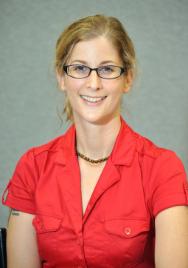Experience of mental illness helps Louise bring Nursing textbooks to life
Published on 20 December, 2011
Louise Byrne has a confident manner, with neat and stylish glasses, hair and clothing and a strong grasp of academic terms.
But it's the more shambolic aspects of her life that make her particularly valuable as a lecturer, who may be involved in a world's-first format for the teaching of undergraduate nursing students.
Louise now describes her role as a Lived Experience Practitioner who teaches 'Recovery' within the mental health field for CQUniversity's Nursing degree.
Earlier in life, as a homeless teenager, Louise was at various times hospitalised and institutionalised and began a journey as a user of mental health services.
She says her mental health issues still 'raise their head' from time to time, and she has ups and downs, but these days she knows 'how to get back up again'.
As a younger woman, Louise was able to use her own experiences on the streets to help troubled kids, including Indigenous teens, homeless youth and those at risk of suicide. She honed her sense of social justice by encouraging young people to tell their own stories through plays, short films and mixed media productions.
It was this real-world credibility that enabled Louise to complete a Masters by research degree with Griffith University without having done an undergraduate program.
Now she has embarked on her PhD research, seeking out best practice for lived experience practitioners who are collaborating in the mental health field. Louise has also been well received as a national conference keynote presenter in the field of mental health nursing. She has also done a keynote for a conference in the legal profession, as solicitors are focusing on reducing stigma relating to mental illness in the workplace.
CQUniversity's Engaged Research Chair in Mental Health Nursing, Professor Brenda Happell says that understanding what it is like to be diagnosed with a mental illness and to experience significant emotional distress is an important step to working as a nurse in mental health.
"This can be a pretty difficult concept to teach, that is unless the teacher understands the experience first hand. Louise Byrne has used her lived experience with mental health challenges and the mental health service system to help students appreciate the journey people take in recovery and the crucial role nurses can play in facilitating this.
"Louise doesn't just teach into this subject, she teaches it, calling on the assistance of nurse academics when she thinks they have something to offer, an interesting role reversal. We think this is a first in the world for the teaching of undergraduate nursing students."
Professor Happell says student evaluations show they think it is 'fantastic' to have Louise's experience to learn from.
"Many described it as the best subject they've ever done, helping them to understand the person in a way that could be adapted to all health settings.
"One student described: 'The most amazing aspect of this course is its humanity. Louise gave of herself (much more than I have experienced any lecturer do before) and this in turn encouraged me to give of myself ... it has changed my thinking in soooooo many ways ... It has made me a better person and therefore a better nurse'.
"The mental health team is currently undertaking research to explore students' experiences of this innovative approach to learning and teaching."
Professor Happell says Ms Byrne's valuable role is part of CQUniversity's push to stimulate undergraduate nurses' interest in mental health nursing as a career path, including a major focus in the curriculum as a pathway to a Masters degree.


